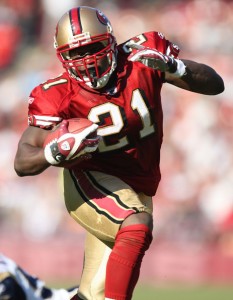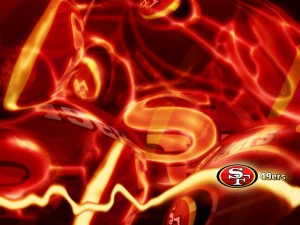 When it comes to sports, it’s the NFL’s world. All the other leagues just live in it. While the NBA and MLB hope and pray that at least one East Coast big-market team goes deep into their playoffs in order to generate fan interest, the NFL can match up bottom-feeders from such trendy cities like Phoenix and Jacksonville for a mid-season Monday night game and routinely trounce a World Series game in the TV ratings, even when the Yankees or Red Sox are playing. This seemingly unbreakable hold on the public imagination has bred an insufferable obsequiousness among sports media, particularly ESPN. I rooted for the NFL owners and players to wipe out a season or two with the lockout just to see what ESPN would do when half of its programming schedule vanished, but instead they settled their dispute over how to divide the most lucrative revenue stream of any sports league on earth—in plenty of time to save their worthless pre-season schedule.
When it comes to sports, it’s the NFL’s world. All the other leagues just live in it. While the NBA and MLB hope and pray that at least one East Coast big-market team goes deep into their playoffs in order to generate fan interest, the NFL can match up bottom-feeders from such trendy cities like Phoenix and Jacksonville for a mid-season Monday night game and routinely trounce a World Series game in the TV ratings, even when the Yankees or Red Sox are playing. This seemingly unbreakable hold on the public imagination has bred an insufferable obsequiousness among sports media, particularly ESPN. I rooted for the NFL owners and players to wipe out a season or two with the lockout just to see what ESPN would do when half of its programming schedule vanished, but instead they settled their dispute over how to divide the most lucrative revenue stream of any sports league on earth—in plenty of time to save their worthless pre-season schedule.
Perhaps out of concern for my negative attitude toward the NFL, the San Francisco 49ers have now provided a reason for me to be interested in football again in almost a decade. The history of the 49ers has not been kind to its fans since Bill Walsh’s departure in 2002 from his final stint in running the team. The franchise that had once been a model of innovative organization became a byword for dysfunction under the leadership of a meddlesome owner and a succession of three head coaches who all quickly demonstrated that they had risen to their levels of incompetence. Though Jim Harbaugh came well recommended to the 49ers, I had every reason not to expect much from him for a while. Even Bill Walsh’s 49ers endured two losing seasons before going 13-3 in 1981 and then turning the league on its ear with Dwight Clark’s leaping catch over Everson Walls of the Dallas Cowboys, a moment so iconic in NFL history that even thirty years later the league uses the play’s footage in its advertisements. And yet, halfway through the season, the 49ers are 7-1 and already are potentially within a game of clinching a spot in the playoffs. Most local sports commentators don’t quite know what to make of this early success, and even Harbaugh has to be somewhat taken aback by it despite having similarly turned around football programs at USD and Stanford. We may as well get used to it, though, because it is apparent that at least for this season the 49ers won’t stop winning for a while.
A quick look at the schedule bears this out. Of their remaining eight games, only three are against teams with winning records, and the other five are against their abysmal NFC West division rivals, whom they should have little trouble handling. They could mail in these games and still end up with a 12-4 record and a bye in the first round of the playoffs. Harbaugh presumably knows how to keep players motivated under these circumstances, so I will go out on a limb and predict that they will exceed this modest expectation and go 13-3, just like the 1981 49ers. How they’ll fare after that is anyone’s guess, since in any league playoffs have the predictability of a crapshoot.
 There is one overriding difference between this version of the 49ers and those that have preceded it for the last several years: an offensive line that has finally become capable of opening holes for Frank Gore and keeping Alex Smith from getting pounded to the turf every time he drops back to pass. The defense, with inside linebacker Patrick Willis clogging up the middle, has been respectable for some time even though the statistics may not agree; it’s hard for a defense to look good when it’s always on the field. With an offense that now allows them some down time, they are at the top of the league against the run. They are mediocre against the pass in terms of yardage, but much of that is due to their opponents falling behind and therefore throwing the ball more to catch up. It would also appear that the rejuvenated offensive line will reveal Smith to be a better quarterback than he has appeared since being picked first in the draft in 2005. He’s not being asked to throw much, but when he does he completes it often enough to have a better-than-average rating. He still gets characterized as a wasted pick, especially when compared to Aaron Rodgers, whom the 49ers passed over in 2005 and otherwise needs no further introduction. It’s an unfair comparison; Rodgers would have fared no better than Smith had the 49ers taken him. Considering the game of musical chairs that the 49ers played with their head coaching and offensive coordinator positions since 2005, combined with the porous offensive lines and mostly inept receivers that he has worked with (with the notable exception of tight end Vernon Davis), Smith should be commended just for remaining in the league rather than blamed for not being as successful as Rodgers or otherwise reminding us of Montana and Young. With reasonable luck and some astute coaching from Harbaugh, Smith’s career will soon justify his draft position to a degree unimaginable before now.
There is one overriding difference between this version of the 49ers and those that have preceded it for the last several years: an offensive line that has finally become capable of opening holes for Frank Gore and keeping Alex Smith from getting pounded to the turf every time he drops back to pass. The defense, with inside linebacker Patrick Willis clogging up the middle, has been respectable for some time even though the statistics may not agree; it’s hard for a defense to look good when it’s always on the field. With an offense that now allows them some down time, they are at the top of the league against the run. They are mediocre against the pass in terms of yardage, but much of that is due to their opponents falling behind and therefore throwing the ball more to catch up. It would also appear that the rejuvenated offensive line will reveal Smith to be a better quarterback than he has appeared since being picked first in the draft in 2005. He’s not being asked to throw much, but when he does he completes it often enough to have a better-than-average rating. He still gets characterized as a wasted pick, especially when compared to Aaron Rodgers, whom the 49ers passed over in 2005 and otherwise needs no further introduction. It’s an unfair comparison; Rodgers would have fared no better than Smith had the 49ers taken him. Considering the game of musical chairs that the 49ers played with their head coaching and offensive coordinator positions since 2005, combined with the porous offensive lines and mostly inept receivers that he has worked with (with the notable exception of tight end Vernon Davis), Smith should be commended just for remaining in the league rather than blamed for not being as successful as Rodgers or otherwise reminding us of Montana and Young. With reasonable luck and some astute coaching from Harbaugh, Smith’s career will soon justify his draft position to a degree unimaginable before now.
With Sundays now meaningful again for more than as a day of worship, I am thankful for the additional diversion they will provide from the crisis that has characterizes my current professional life. I live in California and work in public school finance, of which I need not say more.


